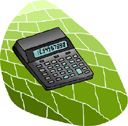How Do You Calculate the Odds of a Hand Busting in Blackjack?
You don't have to calculate the odds of a hand busting in blackjack if you're playing with basic strategy. These charts for basic strategy have already calculate that into their decisions matrix. Still, if you're a math geek, you're probably interested in how to calculate a percentage like this, and luckily, it's not that hard to accomplish.
 Calculating Blackjack Odds
Calculating Blackjack Odds
Suppose you have a hard total of 16. Your odds of busting with that hand are calculated by dividing the number of cards that would bust your hand by the total number of cards in the deck. Any card 6 or higher will bust a hand of 16, so that's any 6, 7, 8, 9, or 10. There are 4 of each of those cards in the deck, except for the 10's. There are 16 potential 10's, because of the face cards. So that's a total of 36 cards that could bust your hand, divided by the 50 cards that are left in the deck. So you have a 72% chance of busting a hard total of 16.
But if you have a hard total of 16, the cards in your hand matter, too. Say you have a hand with a total of 16 that consists of a 10 and a 6. Then you only have 15 potential 10's left in the deck, and you only have 3 potential 6's left in the deck. That's a total of 34 cards that will bust your hand, not 36. 34 divided by 50 is 68%, which is still a greater than 2/3 chance of busting your hand.
You can apply this kind of logic to any total you have in order to determine your chances of busting, but the percentage chance of busting isn't the only factor that determines how you play your hand. It's part of the equation, but it's only part of it. If all you did was try to avoid busting, you'd be giving a big percentage of your action back to the house.
For example, if you have that hard hand of 16, and the dealer has a 10 showing, you're better off taking a hit. Yes, you're likely to lose in this situation, but you're also likely to lose in this situation if you stand. That's because the dealer probably has a higher total than 16--you already know she has a 10.
What are the chances the dealer has a total higher than 16? That's easy to calculate too. Suppose you have a 10 and a 6. The dealer is showing a 10. Any 7, 8, 9, 10, or ace will beat your hand. There are 35 out of 49 possible cards that will make the dealer a winner in this situation, so you can't afford to just stand and hope.
My best advice is to avoid spending a lot of time calculating percentages. Instead, focus on mastering basic strategy, and when you've done that, start thinking about learning to count cards.